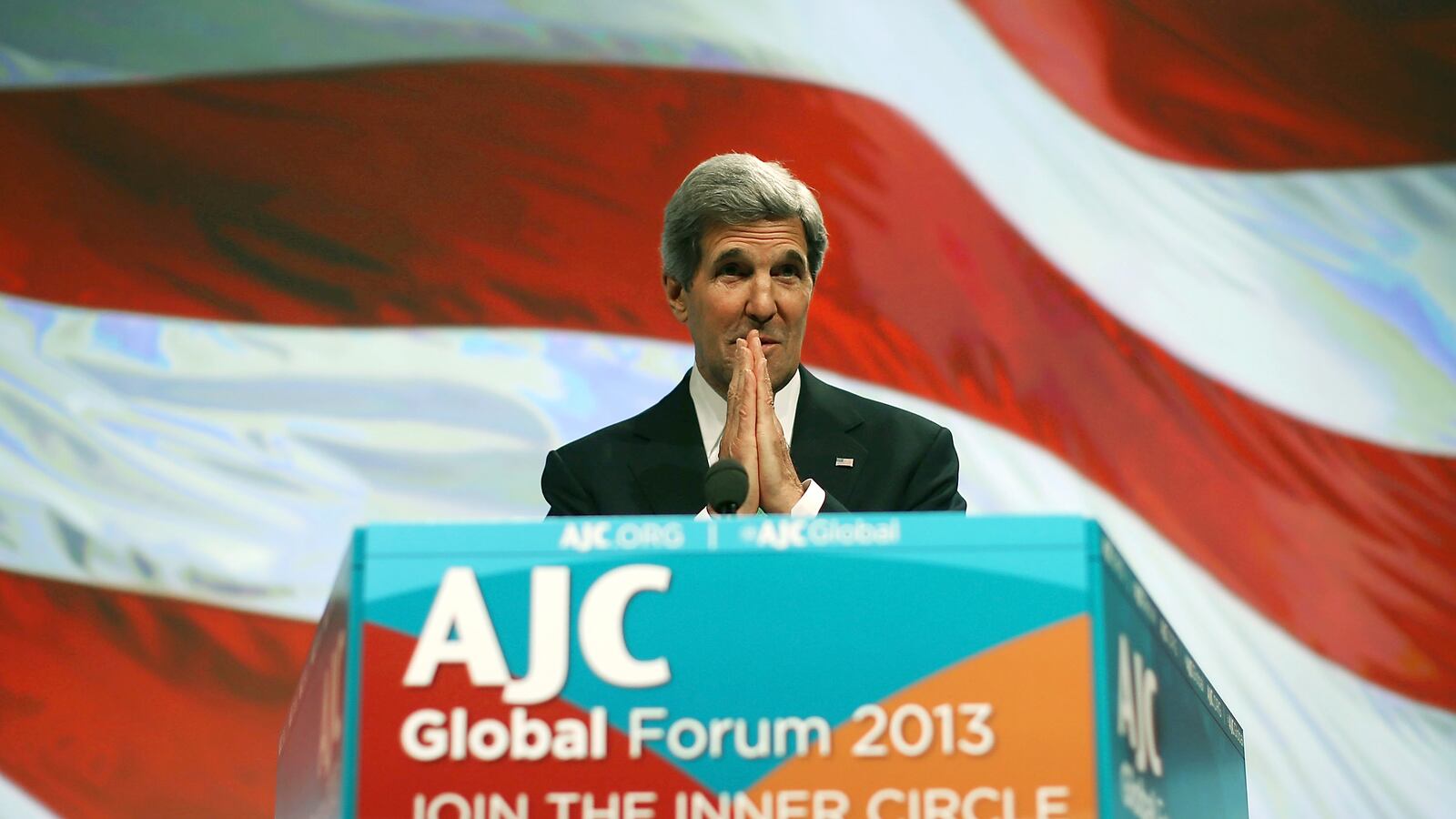In John Kerry's impassioned plea for Israeli-Palestinian peace last night, he struck all the right chords for his audience at the American Jewish Committee's annual confab. He paid lip-service to the Palestinians' "legitimate national aspirations in a homeland of their own," but this was a speech about Israeli—and, insofar as the rhetorical connection remains a firm reality, American—interests. Much of his speech focused on the consequences for Israel of not attaining peace, but Kerry eventually made the positive case for striking a deal, outlining a "hopeful vision" for trade between Israel and Arab states, of tourism, and where regional extremists are robbed of a "rallying cry" to their cause. Lastly, Kerry spoke directly to the AJC audience, imploring that they use their influence to push a peace deal. "[N]o one has a stronger voice in this than the American Jewish community," he said. "You can play a critical part in ensuring Israel’s long-term security."

The direct ask wasn't entirely new, and neither were the positive and negative cases for peace, so Kerry needed to offer a reason that, this time around, peace was really necessary. "Well, the difference is that what happens in the coming days will actually dictate what happens in the coming decades," he said. "We’re running out of time. We’re running out of possibilities. And let’s be clear: If we do not succeed now—and I know I’m raising those stakes—but if we do not succeed now, we may not get another chance." Yet this refrain, too, will sound familiar. Has the opportunity for peace passed Israel by? "They've been saying that since the late '80s," an Israeli activist, Mikhael Manekin, told me this spring in Jerusalem. No doubt, liberal Israelis like Manekin favor a two-state deal, but fear a hollow process for the sake of process. If they aren't subject to Kerry's two-year timeframe, how will most Israelis—who, as Kerry said last week, lack urgency partly due to their own "prosperity"—react? Kerry's warning that the "the status quo is simply not sustainable" will be as familiar in the region as the status quo itself.
The only new item, in the way of the process itself, Kerry discussed was "an economic investment initiative for the Palestinian Territories" announced last week. But it's contours aren't clear, and how, exactly, it plays into getting a process rolling isn't either. The Israeli Prime Minister Benjamin Netanyahu has consistently pushed the notion of "economic peace"—that is, improving the Palestinians' conditions even as they remain under occupation. But those initiatives, too, have had less than exemplary outcomes, not least because, as the World Bank has stated, the occupation remains the primary obstacle to Palestinian economic growth. The sort of outside capital that Kerry's pledged to bring into Palestine has failed under these pressures before.
Other than that, the proposals taking shape look a lot like the efforts of years past, as reported by the Associated Press yesterday:
For the Palestinians, he has tried to curtail Israeli settlement construction in lands the Palestinians hope to include in their future state and recently announced work on a $4 billion plan with international investors to jumpstart the moribund Palestinian economy.For Israel, the talks would encompass new security arrangements that U.S. officials such as Gen. John Allen have been exploring and a suspension of Palestinian efforts to join multilateral organizations such as the International Criminal Court, where they could push for action against Israel.
Kerry's so far extracted key concessions from the Palestinians and Arab States. Most notably, he stalled Palestinian Authority President Mahmoud Abbas's bid to take Israel to the ICC over continued settlement construction—something the U.S. considers "illegitimate," but that Kerry has said he's helpless to stop. Abbas, for his part, won't go to the ICC, but also, for now, refuses to talk until Israel stops building in the occupied territories. Kerry also got the Arab League to amend its historic 2002 offer for peace by allowing so-called land-swaps that would allow Israel to keep large settlement blocks beyond the green line in exchange for the Palestinians taking control over swaths of land equal in size that are currently within Israel's 1967 borders. But these concessions have gone unmatched from the Israeli side—save for what Lara Friedman called settlement "restraint" (which has slowed new tenders but not construction). Indeed, reported the AP, "Two past Israeli leaders have accepted the pre-1967 demarcation as a starting point for negotiations, but Netanyahu hasn't reaffirmed the commitment."
And that, perhaps, is where groups like the AJC come in. The conventional wisdom goes that Israeli leaders care deeply about what the American Jewish community thinks. But these groups don't frequently push Israel and instead offer unconditional support. Instead, their pressure often comes to bear on their own government, the American one, to also give Israel unwavering support. And that's exactly what Kerry offered: "Yes," he said, "the United States of America will always have Israel’s back. We will always stand up for Israel’s security." Israel has, for the meantime, thrived in the absence of peace. Will Kerry's warnings spur the sort activism he hopes it will, and that other warnings like it never have before?






